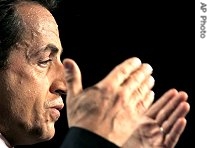2007年VOA标准英语-Immigration, National Identity Take Center Stag
搜索关注在线英语听力室公众号:tingroom,领取免费英语资料大礼包。
(单词翻译)
By Anita ElashParis
18 April 2007
In France, questions about immigration and national identity have taken center stage in the campaign leading up to this weekend's first round of voting for president. The debate started when conservative candidate and former Interior Minister Nicolas Sarkozy said he would set up a new ministry1 of immigration and national identity. Socialist2 party candidate Segolene Royal followed up with her own thoughts on how to promote French pride. Anita Elash reports for VOA from Paris.
 |
| Nicolas Sarkozy, 17 Apr 2007 |
Polls showed that 55 percent of French supported the idea, but media commentators3 condemned4 the idea of tying immigration and national identity. They said Sarkozy was invoking5 the darkest period of French history, the widespread collaboration6 of the French with the Nazis7 under the German occupation in World War II.
Sarkozy said he wants to make sure that immigrants can speak French and embrace French values like separation of church and state.
"I don't know how we can say we're going to welcome new French citizens without helping8 them to integrate," he told reporters. "And to help them integrate, we have to talk about who we are."
 |
| Segolene Royal, 18 Apr 2007 |
The leader of the far right National Front party, Jean-Marie Le Pen, who wants to stop immigration, has been taking advantage of the debate.
"My competitors have put immigration and national identity front and center, even though they have always criticized me and my electors for talking about the same issues," he said in a televised campaign message. "Madame Royal has wrapped herself in the French flag in order to run after Mr. Sarkozy, who is himself, running after me."
Observers say the debate reflects a general discontent in France, and shows how deeply the French are questioning their own identity.
Vincent Michelot teaches political science at the Institute of Political Science in the southeastern city of Lyon. He says the French are unhappy with the economy and with their place in Europe. He says they feel their schools and social security system are being threatened.
"We have right now a crisis over the national compact," Michelot said. "So as a result, the pressures on the national compact have consequences on the definition of French identity. And when there is a crisis in that system, we always turn to a scapegoat10, and that scapegoat happens to be immigration."
Questions about how to successfully integrate immigrants, and their French-born children, made front page news in November 2005, when youths in the largely North African immigrant suburbs around Paris and other French cities rioted over what they considered police harassment11. The problem was highlighted again a few weeks ago, when about 200 young people rioted at Paris' Gare du Nord train station.
Sarkozy has not said exactly what his new ministry of immigration and national identity would do or how it would help prevent incidents like the ones at the Gare du Nord or in the suburbs. New immigrants, on arrival in France, are asked to sign a contract that requires them to learn French, a measure Sarkozy implemented12 during his time as interior minister. Other ministries13 are equipped to deal with issues such as integration14 into the workforce15. But Michelot says that even if the ministry has no new powers, it would be a dangerous symbol.
"Identity should not be defined by government, or by historians," he said. "Nobody has a monopoly on the definition of identity and when there is such a ministry as the ministry of identity, we enter a very slippery slope which might lead us to a definition of what is un-French, and this is very dangerous."
Commentators also say they're alarmed that the issue of national identity and immigration has won so much attention during this campaign. They say it shows that the far right ideas of Le Pen are becoming more acceptable in France.




